Tessie Time
A character in MOTHER 3 goes by the name of “Tessie”, or テッシー in Japanese.
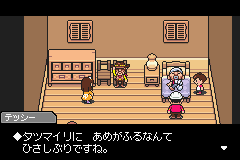 | 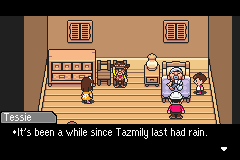 |
If you’re a series fan you might think this name is a throwback to the previous game, but that doesn’t seem to be the case; in MOTHER 2, the sea monster went by the name “Tassy” or タッシー in Japanese. This was changed to “Tessie” for the EarthBound localization:
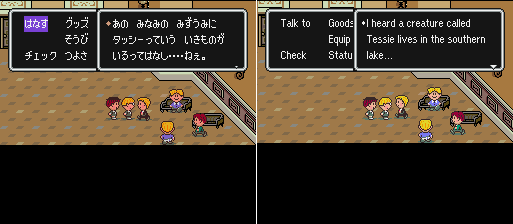 |
So either this “Tessie” name in MOTHER 3 was a coincidence or Itoi was somehow inspired by the EarthBound localization, which doesn’t seem very likely, but I guess there’s no way to know without actually asking him.
A Poet for the Ages
If you talk to Bud right away, he comes up with a little haiku that sort of explains the motto of Tazmily – that the place is about people helping each other. Similar to previous poems, I tried to format the translation in a way that makes it more obvious for readers that a haiku is happening.
Standard haikus have 5 syllables, 7 syllables, and then five syllables… except on closer inspection it looks like I went 5/6/5 on accident! Drat, I can’t believe I missed that!
 | 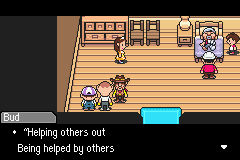 |
In situations like this it’d be easy to say, “Oh, uhh, I meant ‘helped’ to be pronounced a weird way with two syllables, yeah!” But that’d just be after-the-fact rationalization. I’ll add this to the list of things I ought to fix!
Everything’s All Right
The words “all right” and “alright” are an interesting thing. I remember being taught that only the first one was right and that the other one was wrong. I was later taught that both are okay. Then I was again taught that only the first one was right. Then I was taught that both were okay. So which is it?!
Again, I think it’s just a case of the language evolving and different people learning different styles depending on where they live, what schools they attended, and all that. I’m okay with both spellings, and as the years pass on I sort of swing between toward one and the other.
At some point in my translation career I decided, you know what? “All right” looks a little more formal than “alright”, so maybe I can use different spellings depending on what I’m working on, who’s speaking, stuff like that. So I think you might see instances of “all right” and “alright” in the MOTHER 3 translation, depending on who’s doing the talking.
In this instance we see Lou, a sort of silly, not very bright character using “alright”, but I bet I used “all right” with smarter characters, like, say, Dr. Andonuts or someone.
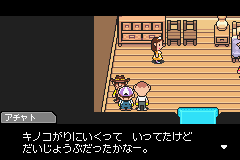 | 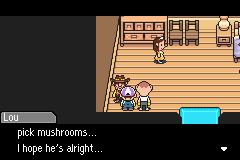 |
At the time I thought this use of “all right” and “alright” was a clever way of trying to add back in some of the subtle personality that gets lost in Japanese-to-English translation, but now it just seems inconsistent and unprofessional to me. I use “all right” 100% of the time in my professional work these days, so in a future patch I might just go back and change all the “alright”s to maintain consistency.
…Man, I’m sure this sounds like crazy person talk, but in all honesty translation IS about being detail-oriented.
Potty Reminder
There’s a sign in the Yado Inn that gives you a pre-sleep reminder. I have the line translated as, “Be sure to use the bathroom before hitting the hay.”
Super-literally it’s more like, “Let’s go pee before we sleep.”
The main thing, though, is that this sign is meant to keep lodgers from wetting the beds… which is a tiny little joke I hadn’t really realized until now! You know how you can watch a movie over and over and notice new things each time? I guess translation is the same sort of way too!
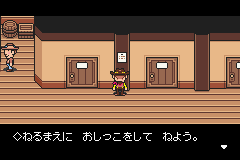 | 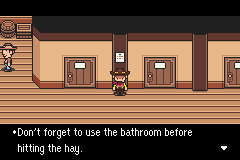 |
Just Jackie
There’s a character in MOTHER 3 named “Jackie”. You might think this is a throwback to the previous game, but it doesn’t seem to be that way – the bar in MOTHER 2 was run by “Boris”, but his name was localized into “Jackie” for EarthBound.
…Wait, this sounds familiar. We just saw that the same thing happened with “Tessie”. WAS Itoi somehow influenced by EarthBound’s localization when naming these characters? It seems like part of Jackie’s job at the inn is to serve drinks, similar to the Jackie character in EarthBound. So maybe there IS a connection?
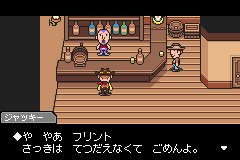 | 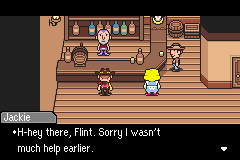 |
Whatever the case, whether these names came from EarthBound or not, they would’ve seemed completely new to Japanese fans.
By the way, here’s a look at what this area looked like in the original Nintendo 64 version of the game!
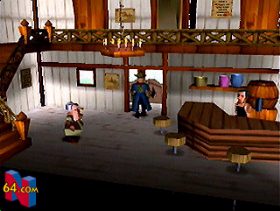 |
The Branching of Isaac
Once you leave the inn, Isaac shows up and starts to chat, with a few questions sprinkled here and there that require answering.
When the translation project hit the text-polishing stage, a big thing I focused on was trying to see every possible message whenever there was branching text. In this case the branches only go two or three questions deep, but as the game goes on it gets a little more complicated, especially by around Chapter 7, where you can play the game in almost any order you want!
While we’re at it, his name is pronounced “Isaku” in Japanese, but equates to “Isaac” in English. I normally wouldn’t even bring this up, but it’s interesting because he was apparently called “Yosaku” in the Japanese Nintendo 64 version. I wonder what prompted the change.
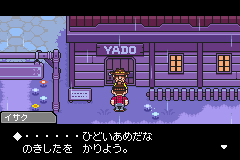 |  |
And here’s what Yosaku was going to look like:
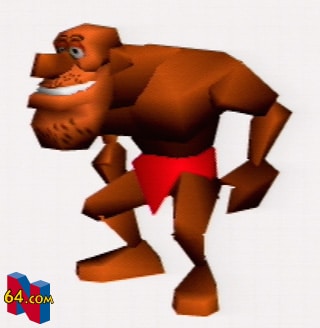 |
Select Your Destiny
If you’re playing a game but can’t read the text well – whether because it’s not your native language, you’re a young kid, or have poor eyesight – having the really important words highlighted in some way is like a godsend. With it, you can immediately pick out what text is really important to the game. In fact, many Western players were able to play through MOTHER 3 even without understanding a lick of Japanese when the game was first released… all thanks to this text highlighting thing!
I kind of always knew this text highlighting was useful in some way, but it wasn’t until my fellow fans used it to enjoy the game that it REALLY hit me how important it is, so I of course made sure to keep all the text highlighting in our own version of the game’s text. At the very least, maybe non-English speakers can use it to get through the game too!
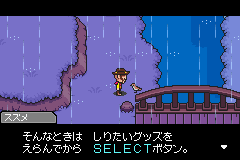 | 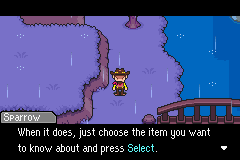 |
Besides the text highlighting, the fact that items have pictures next to them in MOTHER 3 was a huge help for non-Japanese-speaking fans. So the game was designed pretty well from an accessibility standpoint. Thanks, developers!
Uncovering Secrets
Before translation began, the team extracted all of the Japanese text in the game and converted it into text files. This meant we had access to all of the text that gets used in the game, but we also quickly discovered lots of weird text and lines that went completely unused in the game.
At one point, while translating text associated with eastern Tazmily, I noticed a line that said:
There’s writing carved into the tree.
You read it, but it wasn’t anything significant.
I had played through the game several times before, but had never come across this line. So I assumed it was just some unused line like all the rest… but then I decided to investigate all the trees in the area anyway. And it turns out that one of the trees DOES give this line when checked from behind!
Had I never seen the script data for the game, I never, ever would’ve thought to check this tree from behind – after all, none of the other trees in the game do anything. So I bet it would’ve been YEARS until someone else discovered it by accident!
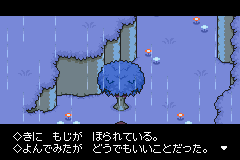 | 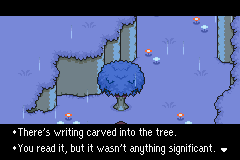 |
Extra Careful
Similar to the mystery tree text, there were lots of lines in the game’s script that were a mystery to me because I’d never seen them before. They seemed like legitimate lines of text too, so I would have to play around in different parts of the game, trying totally new things to get a lot of these lines to finally appear.
As an example, if you try to leave the Tazmily town square after Isaac tells you to head home, he’ll have some stuff to tell you.
It’s through things like this that I began to appreciate how much work game designers have to put into anticipating everything a player can do! It also instilled in me a new sense of exploration in games – now I always try to mess things up or do things out of order whenever I’m playing a game 😛
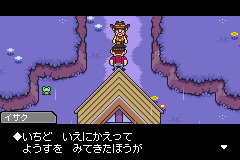 | 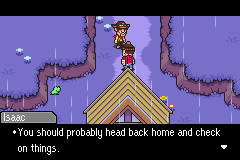 |
Cold Ease
Once Flint is back home, Isaac and Fuel stop by to check on things. Isaac says in this scene:
Oh… They’re still not back?
With all this rain, they could catch cold.
This usage of “catch cold” was how I always heard it growing up, but I quickly learned after the patch’s release that this is another one of those regional things where some people learn things one way while others learn it another way.
From what I can gather, the phrase originates from “you’ll catch your death of cold” and it somehow got shortened to “you’ll catch cold”. But for grammar reasons, some regions added an “a” in there to make it sound right.
In the end, I probably should’ve gone with “catch a cold” simply because it wouldn’t have thrown anyone out of the moment, even if it sounds perfectly natural to me without the “a”.
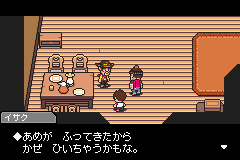 | 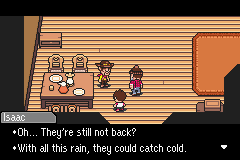 |
Gender Gap
A question I sometimes get or see online is, “Wait, is Boney male or female?”
In Japanese, Boney uses the pronoun “boku”, which is the male version of “I” or “me”, so this indicates that Boney is indeed male. Plus, some characters later on in the game comment on Boney looking like a guy, too.
On a completely different subject, I should point out that most of the animals and creatures in the game use onomatopoeia (sound effect words) in the Japanese script. The problem is that the Japanese language uses onomatopoeia much more often than English does, and many times there are no English equivalents of Japanese sound effects. Whenever this situation turns up, it’s common translation practice to write the name of the sound in question.
For example, Boney makes a whiny, whimpering sound in the Japanese script here, pronounced “koon”. What sound effect does a whimpering dog make in English, though? I don’t think we have one, or if we do, it’s not commonly known. So rather than leave it out in the translation, I went with “*whimper*” instead.
This is actually an extremely common problem when translating Japanese manga, and to a lesser extent, when translating anime. So I tried to pull from that experience whenever dealing with Japanese onomatopoeia in MOTHER 3.
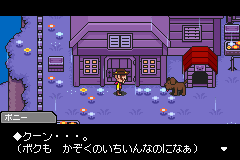 | 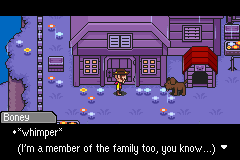 |
A Rare Find
Another set of lines that I wasn’t familiar with occurs when you return to the inn and talk to Bud and Lou again. This time they say something new, but I’d never noticed this until I was actually working on the translation. I hadn’t realized it at the time, but characters will often say new things even after the smallest events, so there’s quite a lot to miss if you rush through the game!
Also, when translating the game’s text, there was no way to know which characters said which lines, so it could be kind of tough to tell who was talking without actually going into the game and trying to find out that way. I did this a lot, actually! And, using the game’s debug menu and plenty of my own save files, I could jump to almost any part of the game and check things in less than a minute. That’s a luxury professional game translators almost NEVER get, so it was definitely another one of those situations where I’m glad I was working on a fan translation and not in a professional environment!
In fact, professional game translations are usually done in dreary, monotonous Excel spreadsheet files without any access to the game itself, so it can get really dull really quickly. And it can take months or even over a year to see your actual translation in action, which is why I really like to work on fan translations. Being able to see you translated text in a game in context with no delay whatsoever gives you the ability to refine text over and over… and it’s a big reason why I keep going back to fan translation projects!
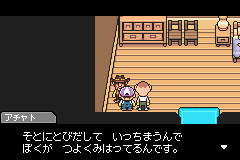 | 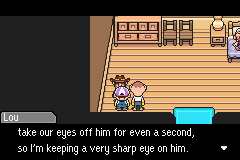 |
Slipping and Sliding
Earlier, I mentioned how a lot of English-speaking fans thought that maybe Abbey was a victim of domestic abuse. I already covered the topic there, but she says something here that’s worth pointing out:
I slipped and fell just a minute ago, but I’m okay.
This seemed to be another another line that sort of made some fans go, “Hmm….”
I honestly think this is just a case of projection or reading too much into things, though. Plus, Tazmily is meant to be a peaceful utopia at this point in the game, so it wouldn’t fit what Itoi was going for.
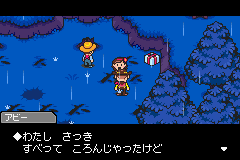 | 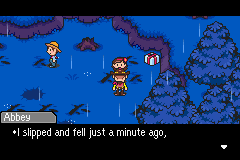 |
Icons of Death
A major part of the translation project involved reprogramming the menus and the menu text system. It was a huge headache, but eventually we triumphed, albeit with some occasional glitches which I’ll point out later.
Things got especially complicated when implementing the new item description code, and it was only made worse when having to deal with the status icons that appear in some item descriptions:
At one point, I was about to give up and say, “You know what, we don’t need these status icons in the description text anyway.” I even considered adding fake icons to the game’s font and using them instead of the game’s status icon sprites.
After some more tinkering, though, I was able to get the icons to work well enough… except they’d only work properly when on the top line of text. At that point I was like, “Aww, screw it, I’ll just phrase things so the icons are always at the top.”
And that’s the story of the status icons.
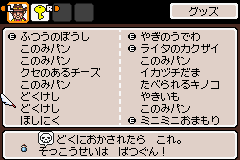 | 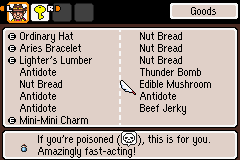 |
No Bones About It
Some of the mystery lines I encountered in the script were actually because there are slightly different ways of playing parts of the game.
For example, if you don’t talk to Boney or if you refuse to let him join you while searching for Hinawa, a few characters will say different things to you.
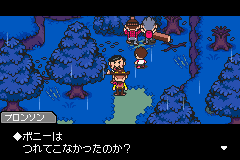 | 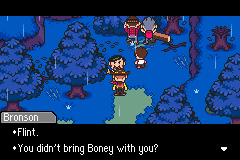 |
Now that I think about it, EarthBound had a few similar things, and without checking the game’s script data back in the day we might still not have discovered some of it:
 | 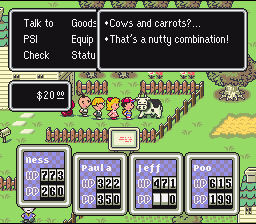 |
Being Cheesy
You can eat cheese in MOTHER 3 to recover HP, just like with any other food item. Except cheese is special – some characters like cheese and some don’t. If a character likes cheese, they’ll have a lot of HP restored. Otherwise only a little bit of HP is restored.
Whether or not someone likes cheese seems to be based on the number of characters in their name. The exact mechanics are still a little fuzzy and it works differently for each character, but as an example, if Lucas has an odd number of letters in his name, he’ll like cheese. If it’s an even number, he won’t like it.
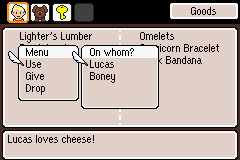 | 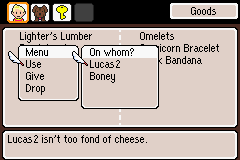 |
| Odd number of letters | Even number of letters |
I never knew about this until after the translation was released, and until I started working on this page I never went and looked into if this still works in our patch… and it appears it does. I’m actually surprised that it works, since we changed the text format from 16-bit to 8-bit, which I was sure would muck stuff up.
One of these days I’ll have to take a closer look at the game’s programming and figure out once and for all how this cheese and name thing works for every character.
Bone Home
If you didn’t bring Boney with you into the forest, Matt will show up with him when you try to head back into town. He’ll stop you and say:
Please don’t say I smell like booze or something.
I told you I’d be just the guy to help you out, remember?
*hic*
See! I brought your dog!
I could tell he wanted to come along.
My awkward phrasing aside, this alcohol reference wouldn’t have remained intact if it had been handled by 90s-era Nintendo of America. That actually got me to thinking, “Maybe, since EarthBound’s localization changed all the alcohol references to coffee references, I should do the same to maintain consistency, if at least as an inside joke?”
In the end, I felt it would be better to stick closer to the original intent of the script. Still, it was an amusing thought!
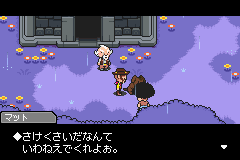 | 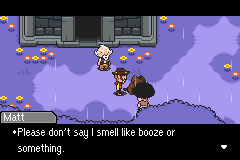 |
Actually, it should be mentioned that Matt’s “hic” sounds aren’t because he’s drunk – it’s revealed much later in the game that he just has bad hiccups. That means all the references to him and alcohol are meant as comedic misdirection, meaning that changing the alcohol reference would’ve killed the joke that gets built up over the course of the game. I hadn’t really considered that until now, so I guess that was another good reason for keeping the booze references in.
Dust Bust
It’s time for good ol’ Duster to save the day! Err, night!
Duster actually gets his name from the cleaning implement – you know, like those feather-y things that you use to clean dust off of surfaces. It’s part of a naming theme, similar to the Flint/Hinawa and Lighter/Fuel things we’ve seen before.
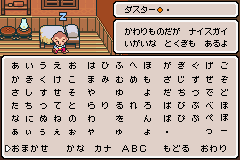 | 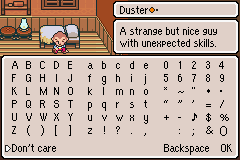 |
He went by the name “Duster” in the original Nintendo 64 version too, although he looked quite a bit different:
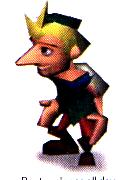 |
Waste Not
Wess’ name is a bit of an odd one. Some fans translated it as “Wes” prior to the patch’s release since that’s a common first name in English, but for some reason I felt “Wess” looked better. I’m not sure why, maybe it’s just because it felt more “EarthBoundy” that way, similar to how EarthBound’s main character was called “Ness” rather than “Nes”.
Anyway, Wess’ name is a Japanese reference to a rag or cloth for used for wiping things clean. In a really weird, roundabout way it originates from the English word “waste”, but when it was adopted into the Japanese language its pronunciation and meaning got all twisted up into something that sounds like “Wess”.
Basically, his name is meant to be thematically linked with Duster’s as a cleaning tool.
In all honesty, I really should’ve changed his name to some other cleaning item to make the thematic connection clear. Off the top of my head. things like “Rags” and “Mopp” come to mind. But I bet given some time I could’ve come up with something better than those.
 | 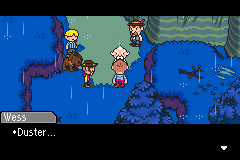 |
Can’t Wait
From the time of MOTHER 3’s release in Japan to the time the English patch was released, about two and a half years passed.
During that time, EarthBound fans were really desperate to be able to play through the game. Some fans started on translation walkthroughs right away. Some made special translation sites to help fans get through the game. I even wrote my own spoiler-free ”how to get through the game” guide.
But most memorable for me was when one fan rigged together a Japanese text recognition program and a Japanese-to-English dictionary to create a program that would translate the game’s text as you played the game!
Here’s an example screenshot of it in action:
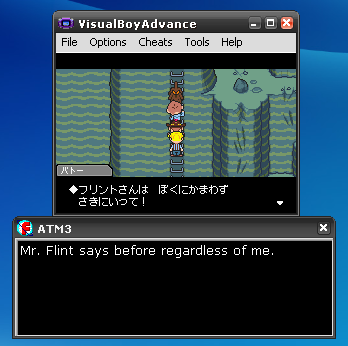 |
Even if the translation is nonsense, it’s still an impressive feat and proof of how far fans were willing to go to play MOTHER 3 in English!
For reference, here’s how this line looked in the original Japanese and in the final English patch:
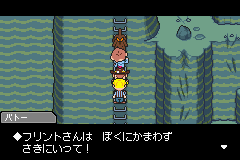 | 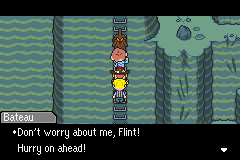 |
Sadly, I don’t have a copy of the program. But every so often I get the desire to make a version of our patch that uses machine translation like this to create a really weird and goofy sounding version of the game. Maybe some decade!
National Secret
At the top of the cliff is a small cave with a few moles and some items you can get. Does anything else seem unusual?
…There’s a map of Japan on the floor!
 | 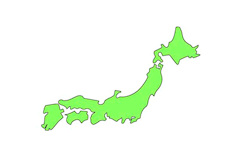 |
I didn’t catch this during my first playthrough, but the second time I was like, “Holycrapitsjapan.”
I had briefly considered changing this for the English translation since that’d be a double meaning for the word “localization”. But there were two problems – one, we didn’t know how to edit maps and two, what would I change it to anyway? A map of the United States? I really felt this project went beyond borders though, so that seemed silly and dumb.
So in the end it remained good ol’ Japan, although I’m guessing it flew over most English players’ heads.
Name Thy Foe
A lot of the Chimera enemies in the game use the word “Reconstructed” at the start of their names. “Modified” is probably the more common translation for the term used, but somehow “Reconstructed” always felt more EarthBoundy to me. I had also used this translation choice years before, when translating the official MOTHER 3 preview site, so it felt natural to keep that in the patch.
Anyway, the first Reconstructed enemy you encounter is the Reconstructed Caribou boss. By sheer luck, this long name just barely fits into the enemy name box during battle. Had it not, I probably would’ve had to change the enemy’s name or do some extra reprogramming to increase the size of the box… neither of which I wanted to do. So I’m glad things worked out!
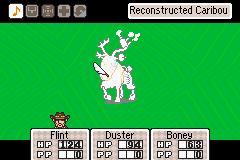 |
Actually, during the last month of the patch’s development, I went and fought every enemy in the game to make sure their names appeared properly in that name box. I could’ve whipped up a tool to do it automatically, but I wanted to do it myself just to be extra sure. I also did the same with items, item descriptions, and more.
Collaboration Across Nations
At some point during the course of the translation project, official Nintendo licensee “The King of Games” announced some new EarthBound shirts and a MOTHER 3-themed shirt!
What was neat was that we folks at Starmen.Net had a connection and friendship with an important guy at The King of Games, so when we saw that the MOTHER 3 shirt was going to have some text on it, we collaborated a bit. I can’t remember the full details off the top of my head, but basically the end result is that some of the text on this shirt appears as-is in the game too!
For example, the pig notebook item uses the phrase, “Tougher! Rougher! Badder!”
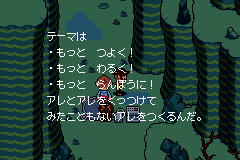 | 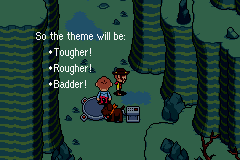 |
And it’s on the shirt as well!
 |
That said, some of the other text on the shirt doesn’t match the translation because I felt it was better for the text to match the context within the game than with the shirt outside the game. But, basically, if you have one of these shirts, you’re wearing part of the translation!
While on the subject of this notebook, the text that it displays is also part of the infamous Block 0, which was kind of like the final boss of the translation project. It took a lot of work to defeat it. Text in Block 0 was very prone to causing memory corruption, and this notebook text in particular caused some interesting glitches during the project!
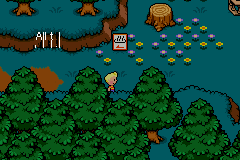 | 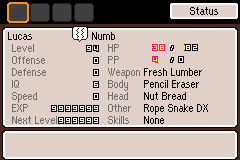 |
| Bleeding text glitch | Nut Bread is not for the head |
Even though fixing these programming issues was really tough and stressful, the blog readers and commenters were always there to provide encouragement and fun. Here’s one reader’s response to the above Block 0 bug, for example!
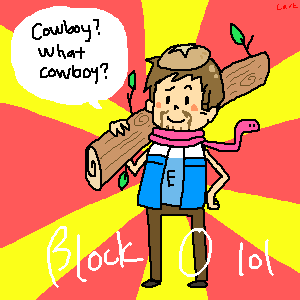 |
God is God
The villagers rush to tell Flint that Lucas and Claus have been found… although Hinawa is still missing. To this, Jackie says, “Hinawa is a wonderful person, so I’m sure God will look out for her.”
This is one of those clear religious references that would’ve been written out or changed entirely by the EarthBound localization team. In fact, they DID write out several references to “God”, even during the final battle of EarthBound.
I’m not sure how a modern day NOA localization would’ve handled it, but I feel it would’ve been smoothed out to not directly say “God” but to still imply it somehow, like with “divine help” or something like that. That isn’t necessarily bad, because cultural and linguistic differences weigh heavily into this sort of thing.
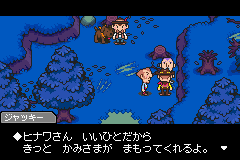 | 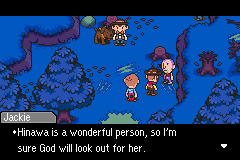 |
Actually, now that I think about it, as a translator it’s always been really tough when handling references to “God” in Japanese text and entertainment.
In English, the name instantly associates with Christianity, but in Japanese that’s not always the case. As such, it can sometimes give the wrong impression that a Japanese game or anime or what have you is referencing Christianity when in fact it’s just referring to an unstated, probably fictional religion that believes in a god of its own.
You know, an article about religious issues that arise during translation and localization sounds really interesting – I ought to write one up someday.
The Secret of the Tea
In MOTHER 3, there’s a simple healing item called “Innit Tea”.
In the original Japanese version, this item has the foreign-sounding name of “Janaika Tea”. This almost sounds like it could be an authentic tea name, but “janaika” is actually Japanese for something along the lines of, “Isn’t it?”
”Isn’t It Tea” doesn’t really seem like an actual tea name, though. So eventually we settled on “Innit Tea”, with “innit” being a common British contraction for “isn’t it”. For some reason I thought I came up with this, but it looks like Dr. Fedora, another translation team member, came up with it originally.
No one’s ever asked me about where “Innit Tea” got its name, though, so I guess either most folks didn’t give it much thought or it just went over everyone’s heads. Even though it’s the most insignificant thing I still sometimes wonder what other possible choices I could’ve gone with.
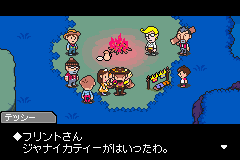 | 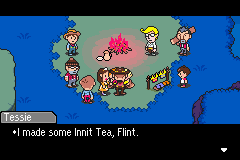 |
Wait a Minute!
At several points during the campfire scene, if you try to leave the current map a character will run up and tell you not to leave. In one instance, Bronson will run toward Flint and shout:
Flint!!
Where are you going?!
Listen to what I have to say!!
Just for five minutes.
No, just for two minutes.
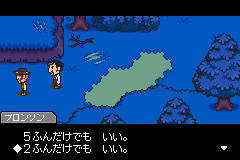 | 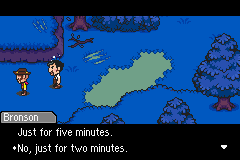 |
Not only is this a semi-hidden line in the game, it’s also a Japanese pop culture reference!
Because I wasn’t born in Japan and didn’t grow up around Japanese entertainment, it’s a lot harder for me to recognize references like this. In fact, I’m not even sure how I realized this was a pop culture reference to begin with – I guess it was either the oddness of the line or a Japanese fan site that tipped me off.
At any rate, this line in MOTHER 3 pulls some lyrics from “Tiger and Dragon” by the Crazy Ken Band:

I recall spending a good amount of time trying to search for Western song lyrics that would be a good replacement for this reference. I couldn’t come up with anything that didn’t sound forced, so I took the last resort choice of leaving it as-is. So even though it’s a line most players will never see, I still often wish I had at least done something with it.
On a different note, someone once asked me why I spelled the numbers out as “five” and “two” when the Japanese scripted used “5” and “2”. This is because in English, it’s somewhat standard procedure to spell out numbers between 0 and 9, or if a number can be written with one word. There are, of course, personal variations and differences of opinions, but it’s what I had adopted over the years of my schooling.
Flint Breaks Down
Probably one of the biggest scenes in the story takes place at this early point in the game. Basically, Lucas and Claus have been found by the river, shivering and barely able to speak, but Hinawa is still nowhere to be found. Eventually, Bronson runs up to Flint with some grave news:
Flint…
…
I’m not sure what to say…
But just stay calm and hear me out.
I have good news, and I have bad news.
Which do you want to hear first…?
Oh, that last line of text appeared in one of the N64 screenshots!
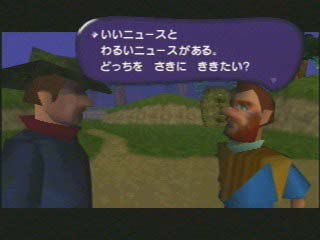 |
Anyway, continuing on, Bronson says:
No…
Let me start with the good news first.
I picked up a giant “Drago Fang”.
It’ll make for a great weapon.
I figured you could probably use it.
So far, so good.
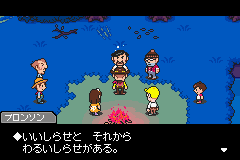 | 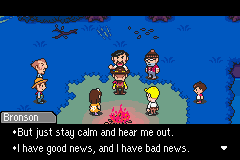 |
Bronson continues:
……
As for the bad news…
……
The bad news is…
…………
…It’s where I found the Drago Fang.
Uh oh, this doesn’t sound good…
Although it doesn’t really show up well when I type it out like this, it was clear Itoi put a lot of thought into the timing of everything in this bit of text, so I tried my best to keep that flow undisturbed in the translation.
Bronson continues on:
It was……
in your…
It was pierced through your wife’s heart…
Damn. The game just got DARK.
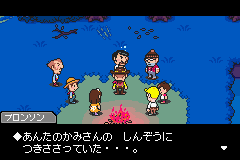 | 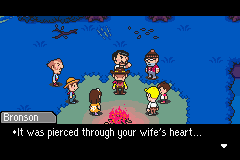 |
After this, Bronson tries to keep Flint calm. Flint says nothing. He slowly walks to the campfire, pulls out a fiery log, and starts swinging wildly. When his neighbors try to calm him down, he violently lashes out at them until eventually someone knocks him out.
The amount of time and effort put into the writing, timing, art, and animation of this scene is amazing. This scene is considered one of the best examples of conveying emotions with 2D graphics and without using text… but it’s also considered one of the dumbest scenes in a modern RPG. So which is it?
The main complaint seems to be something like, “What a jerk. Why would Bronson say something like that?” or “This is stupid, why kill off a main character this quickly before the player’s even had a chance to connect with her?”
The way Bronson delivers the news is indeed really poorly done… from our point of view; from our perspective on the world. But it’s important to keep in mind that Tazmily is supposed to be a peaceful utopia where nothing bad ever happens and the people only know happiness. The game practically says so word-for-word; the problem is that it doesn’t say this until the end of the chapter, AFTER this scene. And even then, the full details don’t emerge until the end of the game.
So it’s entirely understandable that players would place Bronson’s lines in the context of normal, real-life society. In Tazmily’s society, though, the people have never experienced anything like this. As a result, they’re not sure how to cope with this sudden tragedy. In fact, that’s exactly what Bronson says at the start – that he’s not sure what to say.
So, even though it seems like a crappy way to break horrible news, keep in mind that Bronson didn’t mean any harm by it – he just didn’t know how to handle the situation, much as Flint didn’t know how to react. The fact that the “good news, bad news” line existed in the Nintendo 64 version also indicates that Itoi was very set on having the news delivered in this unusual way.
As for why kill off a character before the player can get emotionally invested in her… that’s a game designer thing that I can’t really argue for or against. I feel that it was handled well enough, though – it’s established that she’s a loving mother and a caring wife, and as the game progresses you hear more details about her from other characters. I also feel if every story handled every tragedy the exact same way, it would get boring pretty quickly and stifle creativity. And you’d be able to see character deaths coming from a mile away.
That said, it does feel like it happened pretty early into the game. Maybe it’s partly because the original N64 story was condensed and shortened for the GBA release.
Anyway, it turns out there are multiple N64 screenshots from this scene. When they were first released they held no clear meaning or significance for fans, but now they make a lot more sense. Here’s what Flint’s wild attack would’ve looked like, for example:
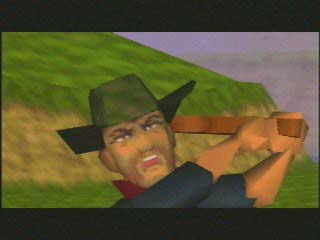 |
And all those years I thought he was just fighting a monster in that screenshot!


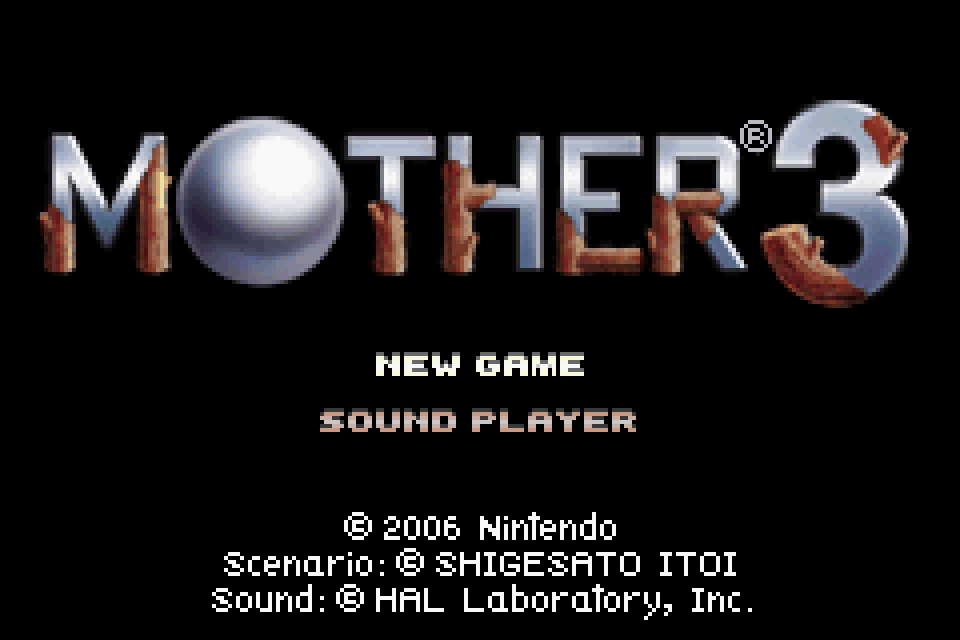
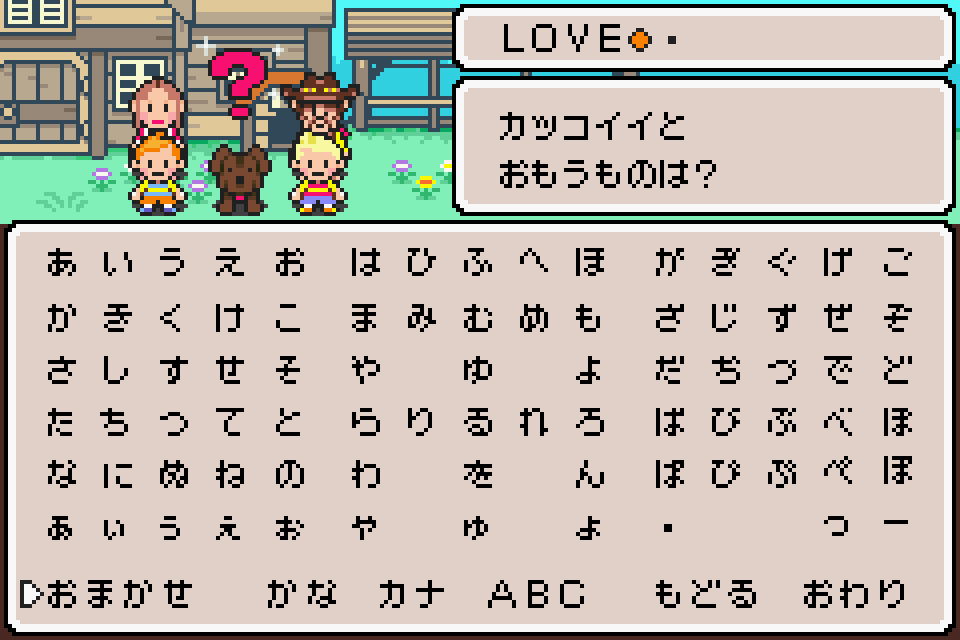
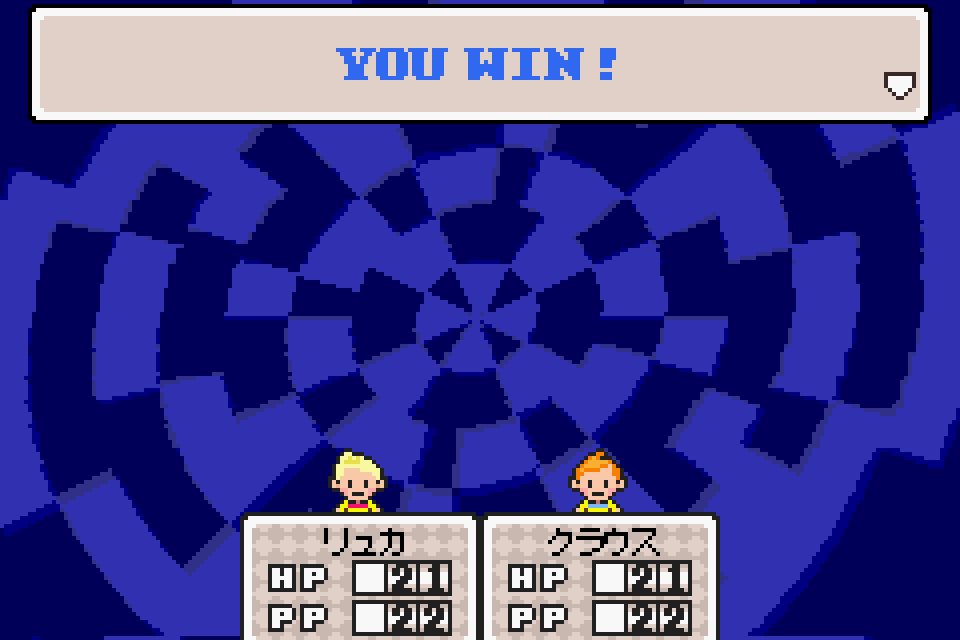
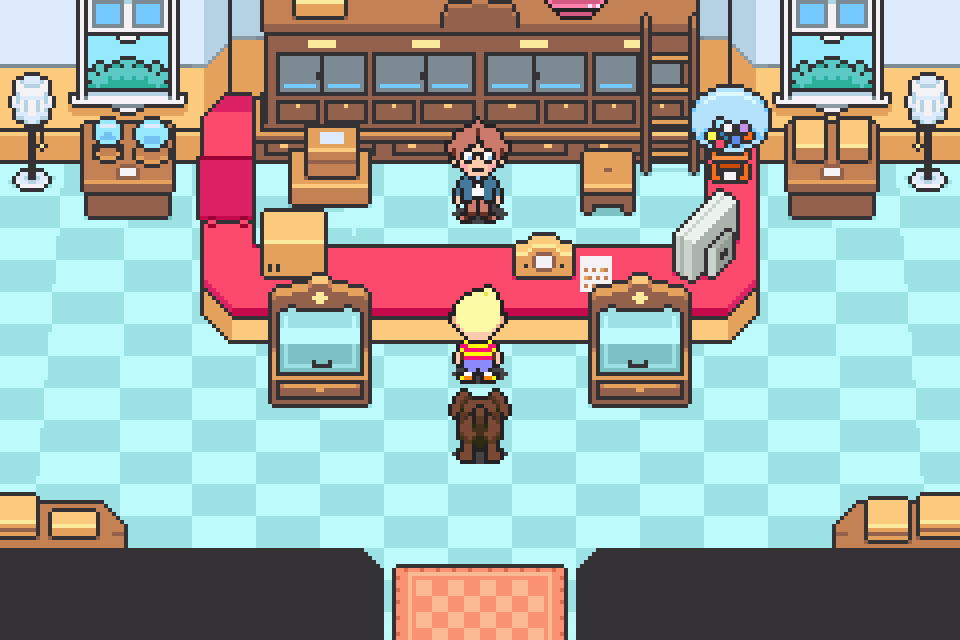
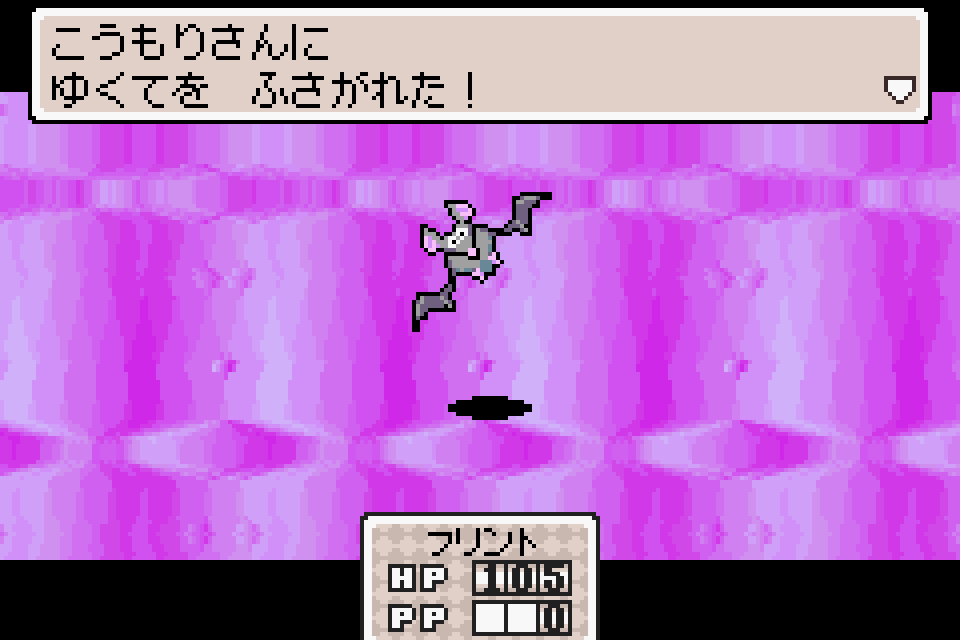
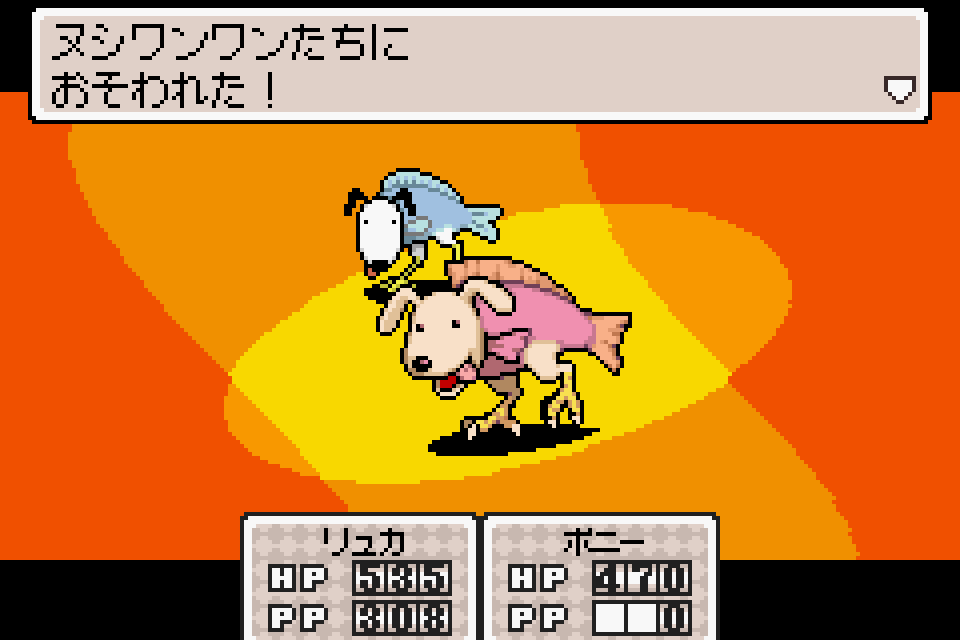
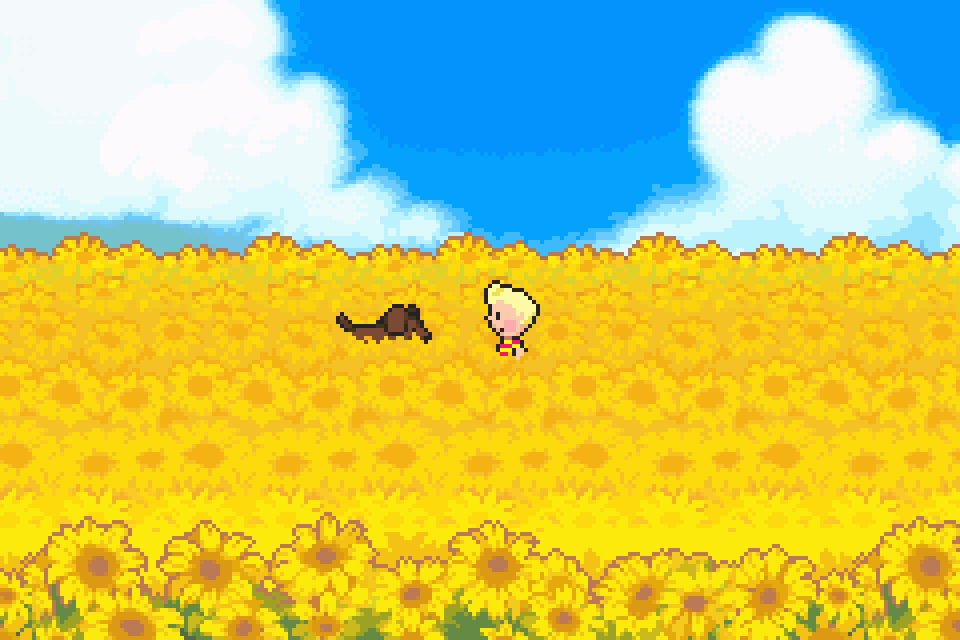
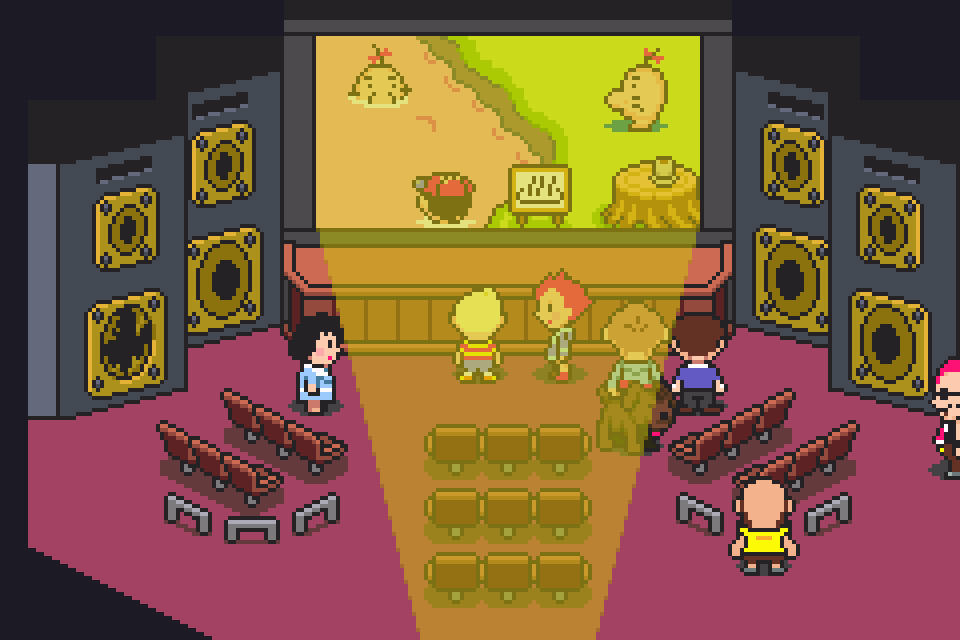
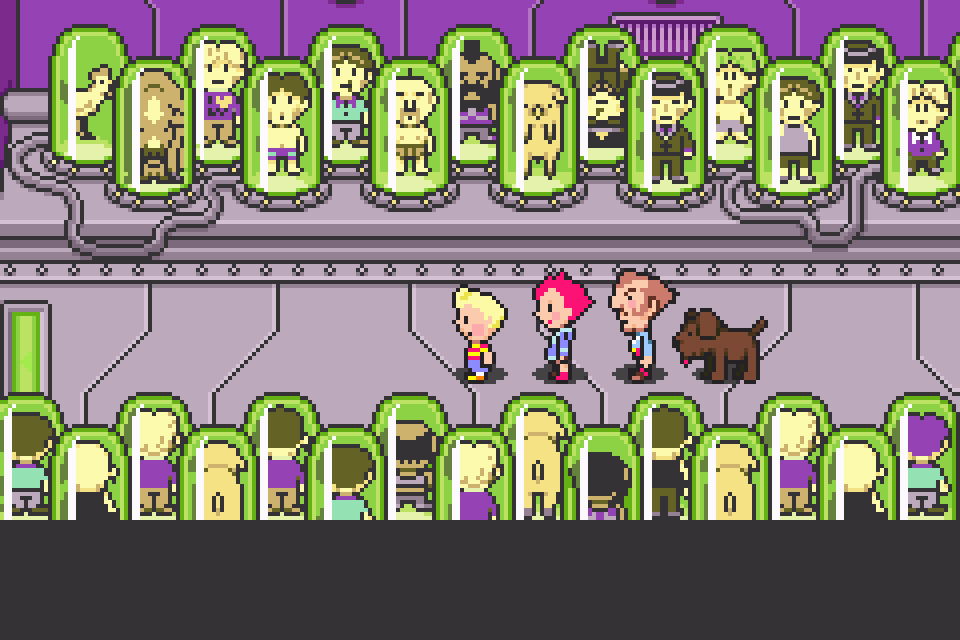
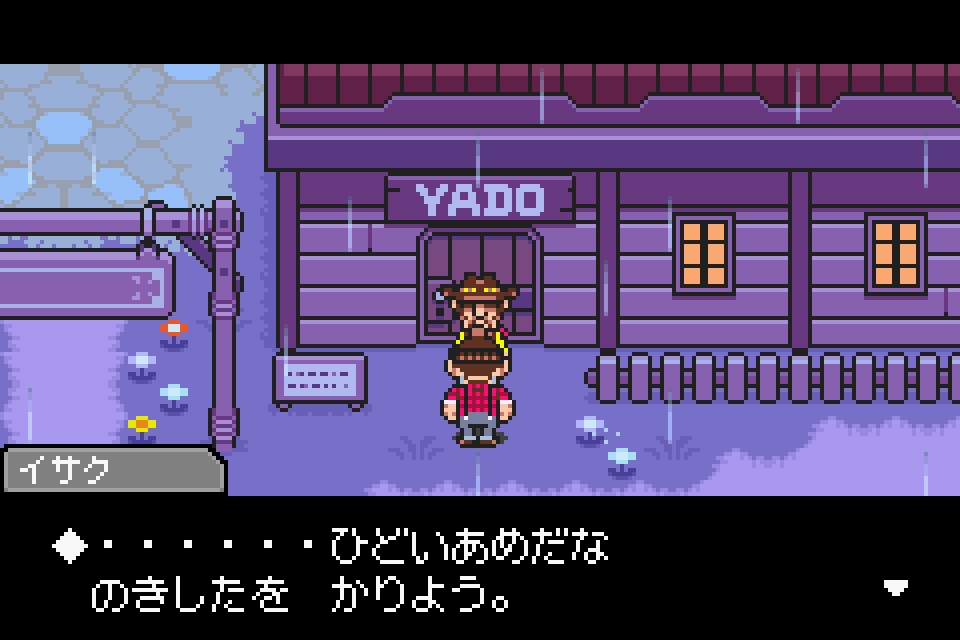
![Passport to MOTHER 2 [Learn Japanese!] Passport to MOTHER 2 [Learn Japanese!]](https://legendsoflocalization.com/wp-content/uploads/2018/05/pp-m2.jpg)
No Comments